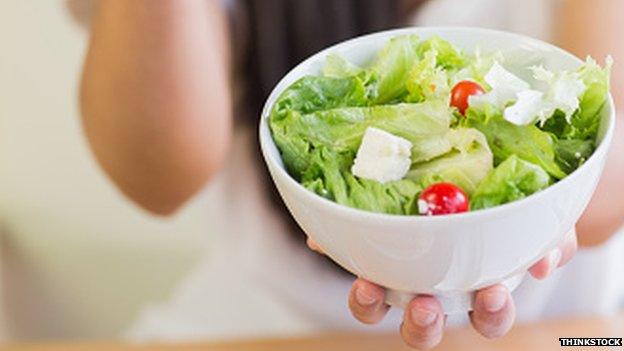Low-fat diet 'burns more fat', study finds
- Published

Scientists looked at which type of diet led to the greater loss of body fat in lab conditions
Eating a low-fat, rather than a low-carb diet leads to a greater loss of body fat, according to US National Institutes of Health scientists.
They strictly controlled the diets of 19 people so they all had exactly the same calorie intake.
The results, presented at the annual meeting of the Endocrine Society, showed 67% more fat was lost on a low-fat diet than a low-carb one.
But experts questioned which diets people could stick to in real life.
The researchers said most dieters ended up cutting out a mixture of protein, carbohydrate and fat from their meals so the scientists set out to explore the relative contribution of each food type.
It required experiments that could not be repeated outside a laboratory environment, in which the content of every meal was precisely controlled.
Diet comparison
The 19 volunteers were all obese with an average body fat percentage of 40% at the start of the trial.
They spent five days on a diet designed to match how many calories their bodies were burning. It consisted of 50% carbohydrate, 35% fat and 15% protein.
They then moved to the focal point of the study for the next six days, in which calorie intake was cut by 30% or around 800 calories per day.
Half were placed on a low-carb diet of 30% carbohydrate, 49% fat and 21% protein.
The rest were placed on a low-fat diet - 72% carbohydrate, 7% fat and 21% protein.
After those six days, the participants had a couple of weeks to recover before starting all over again and trying the other diet.

The participants' diets were strictly controlled
Their scientific presentation said: "Body fat loss was 67% greater after six days of low fat versus low carbohydrate."
Dr Kevin Hall, from the NIH National Institute of Diabetes and Digestive and Kidney Diseases, told BBC News: "It's not easy, these folks had to eat the same meals every day.
"This was very strictly controlled and they had to eat the food provided and nothing else, the diets got pretty boring pretty quickly."
While providing interesting physiological insights, those comments raise concern in experts trying to help people lose weight outside strict laboratory conditions.
Real-life challenge
Susan Jebb, a professor of diet and population health at the University of Oxford, told the BBC News website: "This is a neat study, but it is very small and designed to investigate the metabolism of fat and carbohydrate under highly controlled conditions, rather than longer-term weight control, where behavioural factors become increasingly important.
"In 'real life', other factors such as the acceptability of the dietary programme, are likely to be an important factor associated with adherence and, for the most part, adherence over the longer term is likely to make a bigger difference to people's weight."
Dr Hall said long-term forecasts were "fraught with difficulties" but said their mathematical models suggested that the low-fat diet would lead to more long-term body fat loss.
The idea behind the merit of the low-fat diet is generating "fat imbalance".
The low-fat, high-carb, diet does increase the amount of fat being burned by the body, but preventing the fat entering the body in the first place seemed to have greater impact.
Cardiologist Dr Aseem Malhotra was concerned about the health impact of such a low-fat diet.
"The total fat intake of 7% is way too low for this to be sustainable and would likely lead to nutritional deficiencies for the essential fatty acids and the fat soluble vitamins.
"For the best health, even in the short term, eat real unprocessed foods, concentrate on good nutrition and stop counting calories!"
- Published15 October 2014
